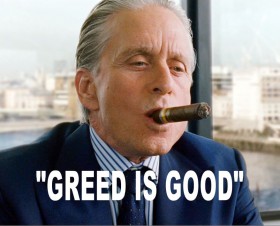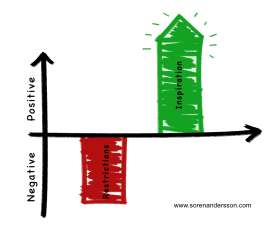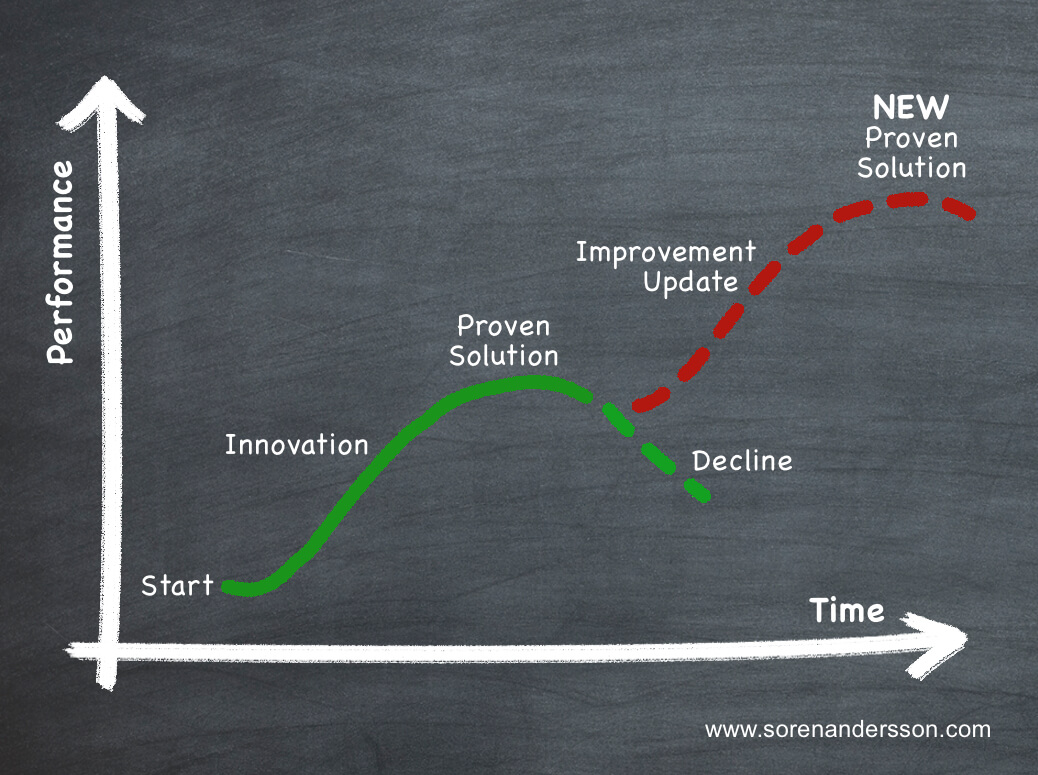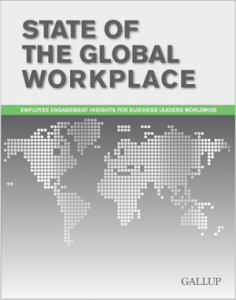
Whenever cheaters like VW, HSBC, Monsanto, Exxon or Lance Armstrong are disclosed, voices are raised to institute more and firmer laws and regulations, to increase supervision and compliance testing etc – but is this really the right or the best way forward?
I’m not in any way implicating that it is OK to break the law, to violate rules or good business practice, I’m just arguing that there might be other ways to reduce cheating.
Maybe we should look into Why people and corporations cheat… and start from there.
A defect culture…
 During 3-4 decades expressions like “Greed is Good”, “What’s in it for me?” and “Business have no responsibility” have formed the resonance of an economic (and political) culture largely based on the theory/idea that a deregulated free market, is
During 3-4 decades expressions like “Greed is Good”, “What’s in it for me?” and “Business have no responsibility” have formed the resonance of an economic (and political) culture largely based on the theory/idea that a deregulated free market, is
“The solution to everything…”
(Read more about “A Free market…” Here)
It doesn’t take a “rocket-scientist” to see where these flawed ideas have brought us…
The events last fall, revealing that even a world-leading corporation such as VW doesn’t hesitate to deliberately cheat if it can gain short-term economic advantages, is only the most recent in what seems to be an endless flow of revelations – Tax-havens, Double Irish arrangements, Anonymous companies, Rampant inequality, illegal and “legal” corruption, the list seems to be never-ending – and it is only focused on acquiring money and wealth at “any cost”…
Some executives and corporations even seems to have drawn the conclusion that it is perfectly acceptable to cheat – It’s getting caught that is the crime…
The way out of this unsustainable and devastating situation is probably not to replace the laws with new laws, applying tougher rules or increased monitoring and punishment, while keeping the defect Culture – We need a Culture-change!
“If you don’t get culture right, nothing else matters!”
Some people immediately argue that industry self-regulation has never worked, and probably never will… Well…, history and the latest “events” show that “regulation” doesn’t have that good track-record either…
Continuing the current destructive culture, allowing for Cheating, Greed and Corruption to gain even more acceptance will not only increase inequality and tensions in our society – it’s a dead-end for Humanity!!
Let’s take a look at some things from the “toolbox” that could prove helpful to the much needed “Culture-transformation”.
Inspiration – Positive vers. Negative
…a reflection on some things regarded Positive versus Negative.
Restrictions
 Most people regard Restrictions as something negative, or as a “burden”. Since a restriction is never seen as “positive” the maximum “Best result” you can reach is “zero” – when all restriction have been fulfilled… or “removed”…
Most people regard Restrictions as something negative, or as a “burden”. Since a restriction is never seen as “positive” the maximum “Best result” you can reach is “zero” – when all restriction have been fulfilled… or “removed”…
Inspiration
This “factor” is by most regarded as positive. So… how high is the maximum “Best result” you can reach when it comes to inspiration? Can you be too inspired…
…this factor have No Limits!
With this in mind, tougher restriction, more compliance testing etc will increase the negative “factors” and in best case, optimal compliance will only bring us closer to zero, but will never pass over to be regarded as positive… and cheaters will continue to put large efforts in circumventing also new restrictions.
If we instead could work with mind-set and culture to create Inspiration to Do Good (as in “Common good for Humanity”) there is literally No Limits!
Read more in this previous article:
Why wouldn’t we want to have a positive impact on the world…?
“There is no higher religion than human service.
To work for the common good is the greatest creed.”Woodrow Wilson
…perhaps the current trend with an increasing interest and focus on Corporate Social Responsibility (CSR) could be regarded as a start – let’s hope it is “For Real”, and no cheating…
Inspiration – Proven solution…
…a “systematic approach” to inspire and encourage innovation.
Most people have probably heard about the “S-curve” of growth and development;
“Start – Innovation – Maturity – Decline”
With the introduction of “economy of scale”, “ISO certification” etc. many companies devote substantial resources to document exactly how to do “their thing”, and then scale-up production to increase earnings, based on this “job description”. Quite often also the “business-model” is closely connected to this.
So, once a corporation have found the best way to do their thing, they have documented it thoroughly, maybe certified their processes, trained the staff and business works well – decline sets in…
…Because the surrounding overall context changes and evolution continues!
There are countless examples of companies and/or products that have become obsolete due to corporations inability to detect and adapt to changes in the context. But regardless how often this is stated, it will happen again…

Perhaps Mies van der Rohes motto; “Less is More” can actually help us to avoid decline?
The intention with most documentation efforts and quality certification schemes (i.e. ISO 9000) is to document and describe a specific process so accurately that it can be repeated again and again achieving the same result.
This is perhaps a good set-up for a very specific manufacturing-process, but for more complicated or complex processes it can actually exacerbate decline…
Mainly because it reduces or limits innovation.
What if we instead focused on documenting only “How” to achieve the result or quality wanted, leaving out as much as possible of exactly “What” to do… and instead give, one or many, examples of “proven solutions” that have actually achieved the “How”.
If there is a “proven solution” to base your new “unique” solution on, the simplest thing would of course be to just copy this proven solution, in that way you would probably do most things right – but the human ambition to improve, to compete, to “make better” is likely to result in improvements of the proven solution, it would most likely also result in adaptations to better suit the current situation.
After analyzing how well the new solution fulfills the basic demands, the result would probably be a new “proven solution”, to add to the others – more up to date and more “in phase” with the changes in the world around us.
…and then everything starts all over again…
Inspiration – Innovation…
In our continually fast-changing world, innovation is not something unique – it is an absolute “necessity”.
 But in a world where trends for a long time has been to make absolutely everything into a “commodity” – something you can mass-produce, something which can be “manufactured” through economy-of-scale – innovation is so much more complex and quite often limited to “upgrades” or “maintenance” of what is already available on the market.
But in a world where trends for a long time has been to make absolutely everything into a “commodity” – something you can mass-produce, something which can be “manufactured” through economy-of-scale – innovation is so much more complex and quite often limited to “upgrades” or “maintenance” of what is already available on the market.
…on the other hand, new innovations can very quickly make common and widely distributed products and services (commodities) obsolete – literarily “over-night”.
When we now, with increasing resource-scarcity and focus on Climate, Diversity, Inequality, a growing population etc, urgently need to down-scale our footprint, innovation will definitely play a more vital role than ever. Upgrading or maintaining an existing product-/service just won’t be enough – we need transformation.
This also means that we probably need to search inspiration “Elsewhere” – scaling down, “reducing” or simplifying a product or service is rather different from adding features or benefits to something already existing. We might even need to re-invent things based on a different worldview or apply “backwards engineering” to find a new path for evolution of specific products or services.
“Any intelligent fool can make things bigger and more complex… It takes a touch of genius – and a lot of courage to move in the opposite direction.”
Albert Einstein
…do you remember, not long ago, when logos, icons etc. had all kinds of “bling-effects”, reflections, shadows and “glows” – then everything was “flattened” and simplified…
Inspiration – People…
 According to a report and a recent article by research company Gallup, a huge majority of employees (87% worldwide) are disengaged from their company or organization…
According to a report and a recent article by research company Gallup, a huge majority of employees (87% worldwide) are disengaged from their company or organization…
“I know everything happens for a reason,
but sometimes I wish I knew what that reason was…”
Employees lack the “WHY” – Why they do things, why their company is doing things… “To make profit”, is simply not a good enough answer!
Quote from previous article: (We are not “Human resources” – We are Human beings…)
“…in the real world, the strive for individual development, individual success, lifestyles, careers etc have never been stronger and recent research show that 65% of people are unhappy at work, only 14% understand their company’s strategy and many do not recognize the behaviors described in their company’s values…”
It is painfully obvious that today’s money-fixed and short-termist corporate culture not only leads to illegal and “legal” corruption and rampant inequality, it also leads to a disengaged workforce.
Reality is that Business is a very significant part of our society, business was created to solve some of our societal needs, but somewhere along the line bad theory has led to bad practice and a flawed Culture based on conceptual errors.
The best organizations and corporations in our Society realized, long time ago, that Inspired, skilled and engaged people is the Keyword to success, and that they are responsible to society for their actions, regardless if it’s required by law or not…
Conclusion
It took 3-4 decades to create the excesses of short-termism and extreme forms of exploitation-capitalism we are currently experiencing – let’s hope we can move away from it much quicker, our survival on this planet may very well depend on it…
…inspiration has NO LIMITS!
